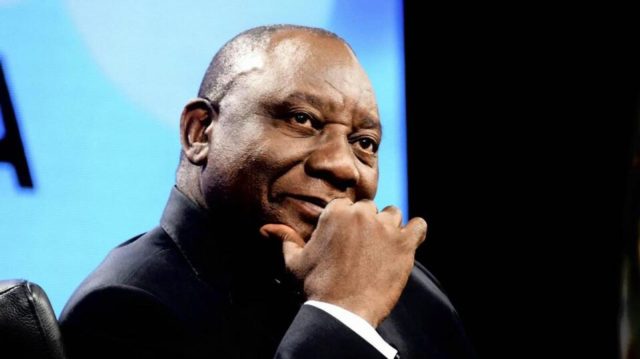EFF secretary-general Marshall Dlamini, in his affidavit argued that Ramaphosa’s financial details should be unsealed because the secret private funding emboldens corruption in the political and governance space.
If President Cyril Ramaphosa was to be seen as above board in the fight against corruption, he must unseal the CR17 documents and reveal the financial records regarding donations received by his campaign, the EFF has argued in its application to the North Gauteng High Court.
Ramaphosa is expected to oppose the application.
The EFF this week filed papers at court seeking an order that would allow Ramaphosa’s bank statements, which were linked to Public Protector Busisiwe Mkhwebane’s investigation into the CR17 campaign, to be unsealed. A full bench of the same court had in March set aside Public Protector Busisiwe Mkhwebane’s report that found that Ramaposa had abused his powers and misled the parliament with regard to the funding of his campaign for the ANC presidency.
Prior to the court setting aside Mkhwebane’s report, Ramaphosa had successfully convinced the court to seal his financial details. EFF secretary-general Marshall Dlamini, in his affidavit argued that Ramaphosa’s financial details should be unsealed because the secret private funding emboldens corruption in the political and governance space.
“Secrecy enables corruption and conduces more to a disposition by politicians that is favourable towards those who funded them privately once elected into public office,” Dlamini said.
In the papers, the EFF, which is represented by Ian Levitt Attorneys, listed Ramaphosa, National Assembly Speaker Thandi Modise and the Financial Intelligence Centre as being among eight respondents.
Dlamini further argued in the application that the country’s Constitution had fundamental values of openness, responsiveness and accountability and that access to funding information would help the public, including members of opposition parties to speak openly against corruption, which he said was a grave concern.
“It is the result of this cancer that the State Capture Commission was brought about. The need for efficiency and effectiveness in the prevention, containment and elimination of corruption linked to the private funding of political parties and independent candidates seems to cry out for urgent intervention.
“The sealing of the records in question is inimical to that ideal,” said Dlamini.
He also raised concern that the secrecy of the funding of the CR17 campaign would create a fertile ground for Ramaphosa to be captured by those who had funded him and also “compromising his ability to independently fulfil his constitutional obligations”.
In justifying the EFF application, Dlamini brought in the issue of the late Bosasa boss Gavin Watson who had allegedly been one of Ramaphosa’s funders ahead of the ANC’s elective Nasrec conference. He said this was similar to the alleged conduct of the Gupta family, which had, like Watson, been brought before the State Capture Commission.
“The evidence emanating from the State Capture Commission is that Watson unlawfully paid and advanced favours to public officials in expectation of government favours in return.
“The theme with the conduct of both Watson and the Gupta family is the secrecy of such payments and favours to the public office bearers,” he said.
Dlamini said he was expecting Ramaphosa’s lawyers to file responding papers within 14 days.
EFF’s lawyers also attached a copy of Ramaphosa’s application where in August last year he requested that his financial statements be sealed to avoid prejudicing third parties, apparently his funders, which he did not name, as “their personal and confidential information would be in the public domain”.
“The third parties in question have not been made fully aware that their confidential and personal information is contained in the record and that it may be disclosed to the public.”
Ramaphosa’s acting spokesperson Tyrone Seale said Ramaphosa had instructed his lawyers, Harris Nupen Molebatsi, to oppose the EFF’s application “and will file papers in due course”.
“On the 15th August 2019, the Deputy Judge President, Mr Justice Ledwaba, ordered that the personal bank accounts of a number of organisations mentioned in the Public Protector’s report be sealed on the basis that they contained the bank account numbers and details of private individuals and organisations and were, accordingly, private and confidential.
“That was a decision of the Deputy Judge President and not the President,” said Seale.
He said Ramaphosa’s commitment in the fight against corruption was “well documented”.








